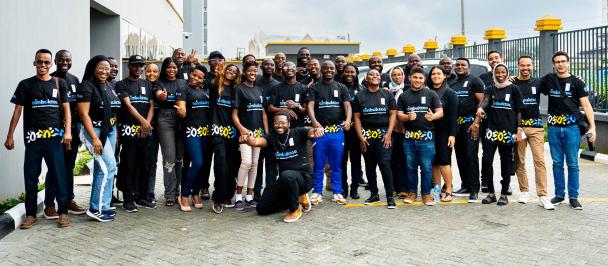African women in STEM and their contribution to the COVID-19 emergency response
October 12, 2020
Copyright: UNDP Kenya
With lockdowns commonplace as a response to the COVID-19 pandemic, the internet has emerged as a major COVID-19 knowledge resource. While there are many ongoing COVID-19 knowledge production and dissemination activities, the flow of knowledge is mostly North-South; and when stemming from the South, mostly from Asian countries. Despite this trend, Africa and Africans have been producing knowledge throughout the pandemic as witnessed by governments, private sector and academia working on different initiatives to help flatten the COVID-19 curve.
The United Nations Office on South-South Cooperation (UNOSSC), in collaboration with the African Union (AU) Department of Human Resources, Science and Technology, has launched a series of seven webinars focusing on African women frontline responders to COVID-19 and their contributions in the different STEM sectors.
The first webinar in the series took place on 29 September 2020 and focused on the experiences and contributions of African women in STEM during the pandemic. The webinar highlighted several ways in which Africa and Africans have contributed to the overall COVID-19 emergency response, including through community-based strategies and practices in epidemiology, and collaborative approaches in handling the pandemic, among other contributions.
In his opening remarks, the Director of UNOSSC, Mr. Adel Abdellatif emphasized the moral obligation and necessity of gender equality and the increased participation of women and girls in STEM (science, technology, engineering and mathematics), noting that it is ‘smart economics’ to empower women and girls in order to increase the potential availability of highly skilled individuals in the economy.
An important consideration raised in the discussion was the importance of home-grown solutions and local production. Women’s contributions have resulted in increased skills with several spill over effects, such as training, capacitation, and experience gathering for younger scientists and other frontline workers; jobs in the (potential) manufacturing sites; as well as the availability and/or creation of role models and mentors and their abilities to inspire a whole generation of African women and girls.
Noteworthy innovations include locally produced emergency ventilators in the Democratic Republic of Congo, as presented by Dr. Ngalula Mubenga. This collaborative effort, built by students, STEM DRC members, clinicians and engineers, involves several partners such as the Government of the DRC, the University of Loyola, e-COM SAS, the Denise Nyakeru Foundation, hospitals, and others.
Another innovation was presented by Ms. Sibongile Mongadi of Uku’hamba, who designed a robot-like conception that used hand sanitizers and interactive software to track body temperatures in public places.
Hon. Minister Stella Ndabeni-Abrahams shared her experience of managing the South African Department of Communications, Digital Technologies, and Postal Services, emphasizing that collaborative efforts with clear and strong leadership were vital to the general success of interventions.
About the webinars
This initiative, jointly conceptualized by the UNOSSC and the AUC, is aimed at optimizing opportunities for African women in the STEM sectors through enhanced professional capacity and mentorship and by leveraging the power of South-South Cooperation in knowledge and experience sharing. The proposed professional mentorship and exchange programme will target women in the STEM sectors in Africa and enable them to gain access to mentors, role models and networking opportunities. This initiative is in part recognition of the new era of digitalization, its growing momentum and the empowerment of women in the sector.
This programme will be juxtaposed within the framework of south-south and triangular cooperation as an initiative to foster mutual learning, collaboration, networking and exchange of best practices among women in the STEM sectors in developed, emerging and developing economies.
Click here to watch the webinar recording.

 Locations
Locations




